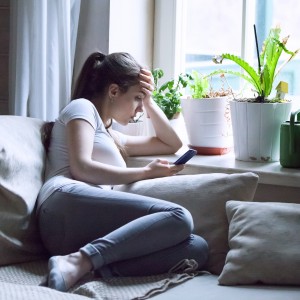Lifting the Burden
Central Florida’s mental health providers aim to improve our well-being, especially in times of crisis.
 Dialogue about mental health has increasingly been encouraged in society over the past few years as the stigma surrounding the topic lessens. History has shown more people seek resources after traumatic events occur, and this current pandemic experience will be no different, according to those who work in the mental health field. Feelings of isolation and anxiety brought on by the pandemic will not only impact those who already have a history of mental illness but others who are perhaps experiencing symptoms for the first time.
Dialogue about mental health has increasingly been encouraged in society over the past few years as the stigma surrounding the topic lessens. History has shown more people seek resources after traumatic events occur, and this current pandemic experience will be no different, according to those who work in the mental health field. Feelings of isolation and anxiety brought on by the pandemic will not only impact those who already have a history of mental illness but others who are perhaps experiencing symptoms for the first time.
Even those in Tallahassee are preparing for an increase in demand for services. Florida’s first lady, Casey DeSantis, who has an ongoing mental health resource initiative, announced a $1.9 million emergency grant to the Department of Children and Families last month. The funding will provide mental health, substance abuse treatment and crisis intervention services to both children and adults who have been affected by the coronavirus public health crisis.
Dr. Luis Olivera-Rodriguez, a board-certified psychiatrist and founder of Lumos Psychiatric Services, says mental and physical health cannot be separated. “Physical conditions can make psychiatric conditions worse, and if issues are left untreated or feelings are kept bottled up, they become more complicated and require more aggressive treatment,” he says.
Decreased activity and interaction with others can decrease a person’s mood. “With these situations there will be a change in the state of how we feel, and if people are noticing things are not feeling right, they should seek help. The sooner we work with them, the better results we can get in the end,” Olivera-Rodriguez says.
Donna Wyche, manager of Orange County Mental Health and Homelessness, says there is an indisputable link between mental illness and homelessness. “So many who are chronically homeless fall into the category of having a serious disability, persistent mental illness and addiction,” she says.
Although the end of institutionalized mental health hospitals was a positive step for how society treated this population, Wyche says there wasn’t a solid safety net and funding for community mental health resources for these individuals to access. “The result of that has led to a chronic homeless population who can’t get well on the street,” she says.
Mental health providers across Central Florida realize that access to their services is more crucial than ever. Alan Bruns, program coordinator for the Mental Health Association of Central Florida (MHACF), says in the past five to six years, referrals for mental health services have doubled. As an organization that helps connect people with appropriate services, as well as trains volunteers to act as guardian advocates, among other programs, MHACF works to destigmatize mental health. “Things are changing and people realize it’s OK to get help rather than it be a negative thing,” Bruns says.
Handling the Pandemic
Although life is starting to feel “normal” again as businesses reopen, the disruption of routine, anxiety over lost wages and stress of balancing work with children’s schooling has done some serious damage to our well-being.
Bruns says MHACF is exposing people to available services who perhaps have never sought them out before. “We’ve created a series of videos introducing people to the specialists in the community and what options they have,” he says.
Support groups are something he suggests for those who are feeling the pressures of their new roles in the pandemic. “We’ve been hearing that people are stressed because they have to work from home and parent, and in addition parents are now teachers,” he says. “There are so many different things they need to balance and they don’t feel there is any time for themselves. Others are lonely if they are quarantined alone, and maybe Zoom helps but everyone is busy, sometimes too busy to sit and talk. Support groups offer a sense of community. It doesn’t always need to be about a mental health condition—it can just be conversations.”
Adults are experiencing strain on their role not only as parents but partners in relationships with significant others as well. Scott Welch, licensed mental health counselor and founder of Mosaic Counseling of Florida, says it’s difficult for couples. “They can’t get a babysitter, can’t leave and have no time to focus on themselves,” he says. “And for couples who made their marriage function because they could get that time away from each other, this has lit the dynamite and they are being forced to address those struggles.” Reconnecting in little ways, often virtually, can be essential. Welch has offered clients a virtual book club on Sunday nights, and as part of his work with couples on military bases through Stronger Families, he hosted a quarantine date night where they discussed transitions in life and how to manage them.
Parents have to be mindful of their own behavior and how it influences their children, professionals say. “We’re hearing a lot of stress from parents and I think it spills over in how it affects children. We’ve seen children taking on the anxiety and fear their parents have, so I think if parents can regulate themselves, that’s important for the child,” says Uschi Schueller, president of Kinder Konsulting, which specializes in mental and behavioral health services for children 10 and under and their families.
“It’s hard for parents to not just give their children the iPad so they can get work done, and then parents feel guilty,” she continues. “I think it’s important parents take a deep breath and try, if they can, to come back to simpler things such as walking, being outside, playing board games, cooking together. Parents are doing their best and these are difficult times so they shouldn’t be so hard on themselves.”
Helping children, especially those ages 0 to 5, through this experience is crucial for brain development, Schueller says. “This is one of the most magnificent times of development and the brain is influenced by the family dynamic—the child’s relationship with their parent or caregiver, what’s occurring in the environment. When the parent is stressed or the relationship is strained, it can affect the child and parent(s) as a whole,” she says. “We know events like this have an impact on children’s mental health long term. We know this because we’ve gone through other disasters like Hurricane Sandy and Katrina. The pandemic is the same,” she says.
“From what we know about mental health, stress, anxiety and fear change your brain chemistry,” Wyche says. “Trauma can spike mental health distress, and many people will carry it forever while still achieving normalcy in their lives. … I do think we will feel the results of this for awhile, but for now it’s important to try to keep a schedule and routine for kids.”
In the bigger picture of mental health, studies show that 50 percent of all chronic mental illness begins by age 14, and 75 percent before age 24. This has inspired much of Orange County’s focus on youth programs, including Wraparound Orange, which Wyche manages. The program is a resource for youth and families who don’t know what is normal behavior or what might be an indication of a more serious problem.
“As a community we try not to label kids really early, so we wait and we wait, and that’s not a bad thing, but it’s not good either,” says Wyche. “It’s difficult for parents when kids go through puberty and become more combative, and everyone says they are just being a typical teenager. But how do you know the difference? You know by sleep patterns, patterns of anxiety and depression, also the change in kids they are hanging out with, a withdrawal from normal activities, a change in grades—these are all things to pay attention to.”
Parents are often afraid to address it with their kids out of fear. “It’s important to let kids know that there is nothing they can’t talk to you about. If something is wrong or scary, they might not talk to people because they don’t want anyone to think they are weird or be bullied, so they hold it and sometimes for too long,” she continues.
Wyche feels Orange County is doing innovative work when it comes to working with children and families to help navigate the system. “We’re creating an environment where people get to the right provider the first time,” she says. “More access, understanding and education about treating mental health just like any other health concern is what will make outcomes more positive.”
This article originally appeared in Orlando Family Magazine’s June 2020 issue.









